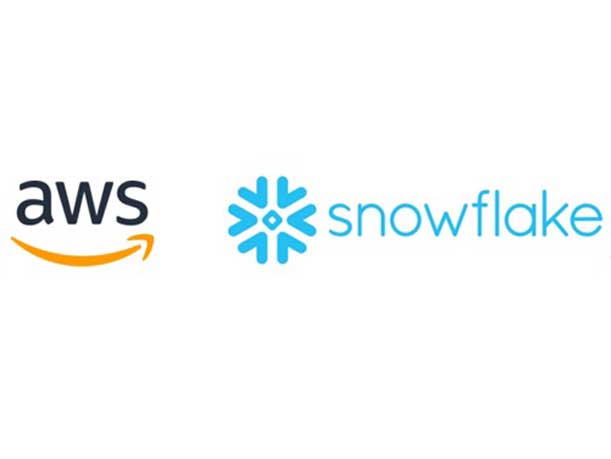Snowflake To Spend $2.5B On The AWS Cloud Over Five Years
In addition to Snowflake’s increased utilization of the AWS platform to provide its own data cloud services, the two companies are pledging increased joint development, product integration, and sales and marketing initiatives.

The Snowflake–Amazon Web Services co-opetition relationship will go on—to the tune of $2.5 billion.
Data cloud service provider Snowflake has entered into a new multiyear contract with cloud giant AWS that includes a $2.5 billion spending commitment over the next five years and plans by both companies to contribute “millions of dollars” to support joint development and go-to-market efforts.
Snowflake unveiled the new agreement with AWS Wednesday, although the announcement did not disclose the value of the deal. During Snowflake’s fiscal 2023 fourth-quarter and year-end earnings call later in the day, CFO Michael Scarpelli said that under the new five-year deal Snowflake has a $2.5 billion spending commitment with AWS, more than twice an earlier deal with a $1.2 billion spending commitment.
[Related: Snowflake Acquisition Expands Legacy Data Conversion Offerings]
“I would say the new AWS agreement is a great step forward in improving an already really good relationship with AWS to begin with. We had a $1.2 billion commit, now we have a $2.5 billion commit over the next five years and it’s [a] much better alignment go-to-market between the two,” Scarpelli said on the earnings call.
Snowflake relies on the AWS platform to provide many of its data cloud services to customers. The company said that 84 percent of Snowflake customers run their deployments on AWS.
Snowflake also uses the Microsoft Azure and Google Cloud Platform to provide its services. During the earnings call Scarpelli said Snowflake is two and a half years into a five-year contract with Microsoft Azure and he indicated that in the future Snowflake will likely look to expand its go-to-market relationship with Microsoft Azure.
Snowflake has utilized the AWS platform since the data cloud company’s earliest days and a huge part of its services run on AWS today.
But as recently as a few years ago Snowflake and AWS were also head-to-head rivals in cloud data services and even today have competing offerings in such areas as managed databases and data marketplaces. But the Snowflake-AWS relationship has evolved in recent years and the two are now more strategic allies that serve joint customers in a spirit of co-opetition.
The announcement of the expanded alliance, in fact, put great emphasis on the two companies’ collaborative initiatives including “both companies contributing millions of dollars to support go-to-market efforts” and taking “a deep, multifaceted approach to fuel growth and drive customer-focused innovation across sales and marketing, industry solutions, product integrations and more.”
“Data is at the center of every application, process and business decision and is the cornerstone of digital transformation. Working alongside Snowflake, we are unlocking new value for thousands of customers around the world and helping them maximize their data investments,” AWS CEO Adam Selipsky said in a statement about the new agreement. “The strong relationship between AWS and Snowflake is empowering the world’s leading businesses to grow and prosper.”
“Over the past three years, Snowflake and AWS have quickly created what we believe may be one of the most successful technology co-sell partnerships in cloud computing,” Snowflake CEO Frank Slootman said in the same statement. “We are continuing to strengthen our partnership with deep collaborations in industry vertical solutions and product integrations in machine learning capabilities, with a single-minded focus on what’s best for our customers.”
Snowflake and AWS said development teams at the two companies have worked closely on industry-specific services that Snowflake has launched in the last year targeting customers in financial services, media and advertising, health care and life sciences, and retail.
The two worked on a series of cloud data services for the telecommunications industry that launched just last week. This week the companies said that development work for services for other vertical industries would continue but did not provide details.
The two companies also will continue “deepening product integrations” between their two technology portfolios in such areas as AI/machine learning, data governance, streaming data and other areas. Snowflake is also running data workloads on AWS Graviton instances.
The two also pledged to increase sales collaboration and field sales alignment efforts, including around large-scale projects to migrate on-premises applications to AWS, and expand their joint marketing efforts.
For the fourth quarter of fiscal 2023 ended Jan. 31 Snowflake reported revenue of $589.0 million, up more than 53 percent from $383.8 million in the fiscal 2022 fourth quarter. The company’s net loss for the quarter was $207.2 million compared with a $132.2 million net loss one year earlier.
For all of fiscal 2023 revenue reached $2.07 billion, up more than 69 percent from $1.22 billion in fiscal 2022. The company’s net loss for fiscal 2023 was $796.7 million compared with the $679.9 million net loss one year before.
During the earnings call CEO Slootman and CFO Scarpelli said there were indications that some customers are committing to shorter-term, quarter-to-quarter spending deals and ramping up service capacity at slower rates due to the uncertain economic conditions.
Scarpelli also said Snowflake increased its employee head count by 1,900 in fiscal 2023 and expects to add another 1,000 employees in the current fiscal year.